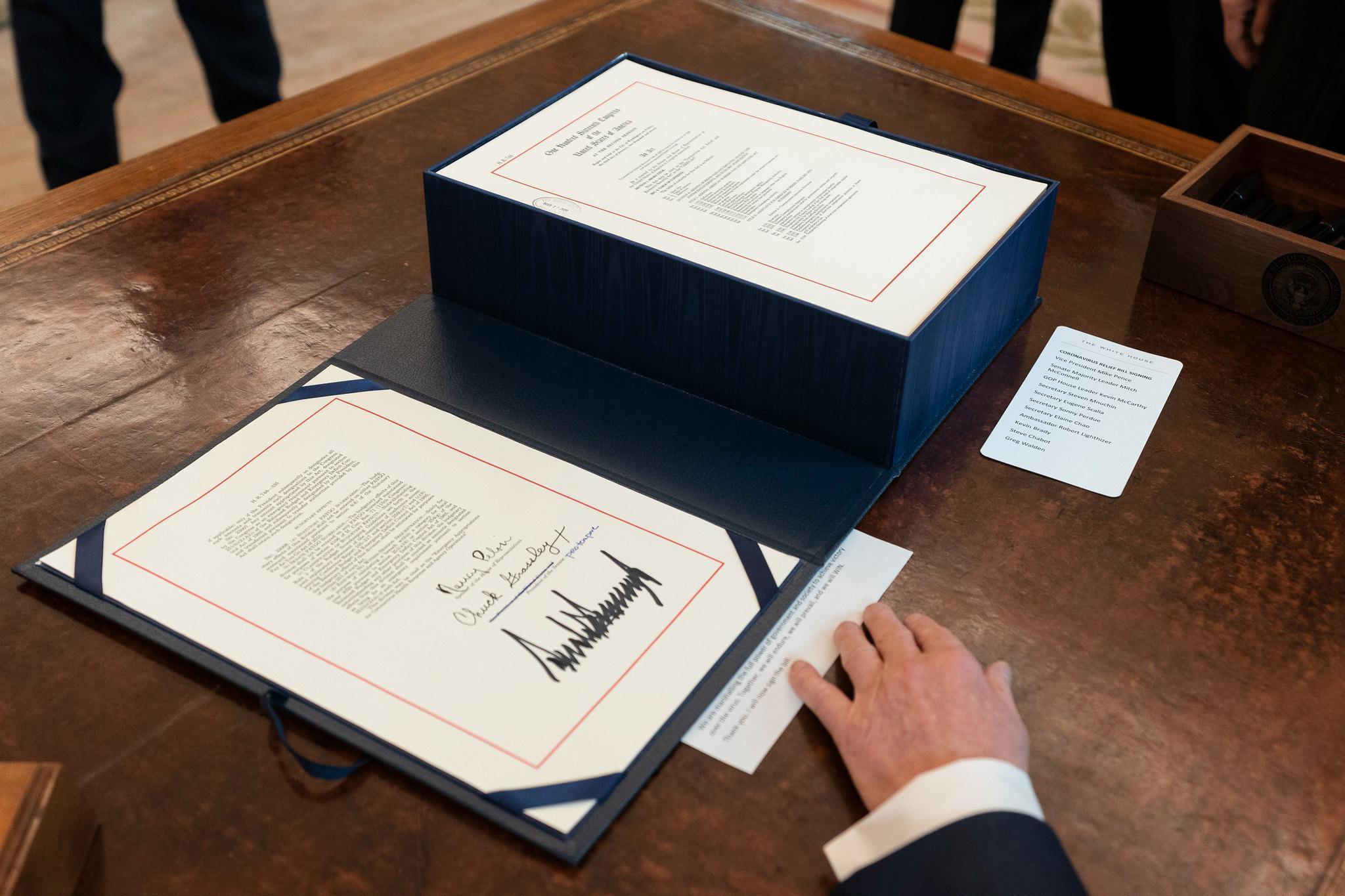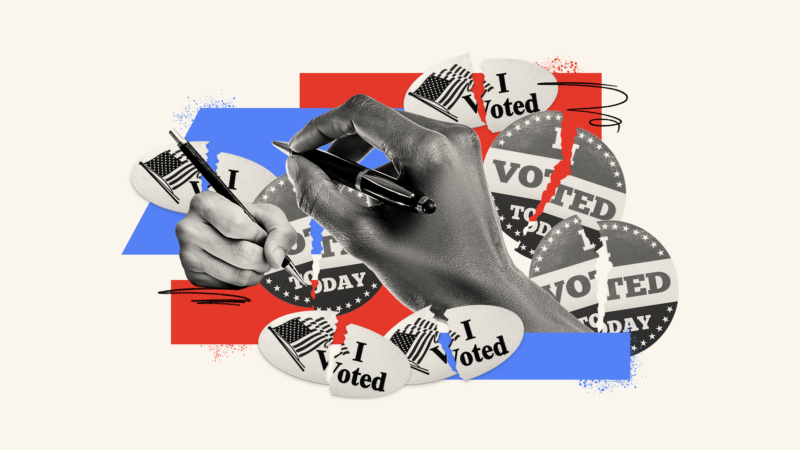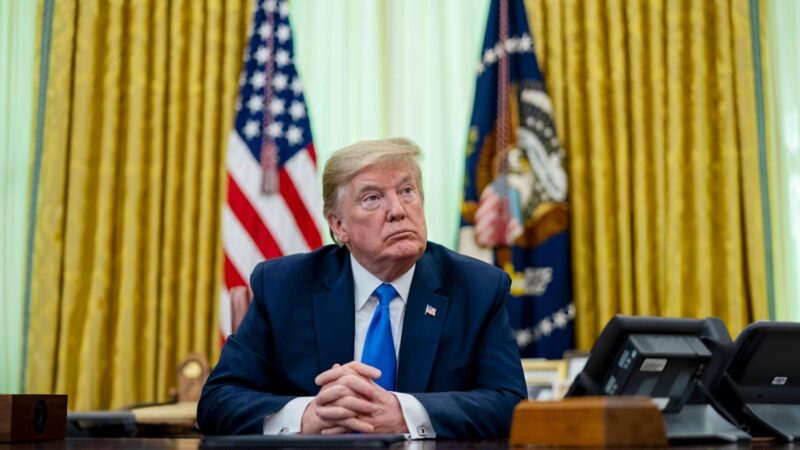Michael Angeloni is a Research Associate at Protect Democracy, where he supports the organization’s work to constrain executive overreach that undermines the rule of law.
The impoundment threat, explained
- June 13, 2024
Trump’s claim that the president has unrestrained constitutional power to withhold funds is wrong

Donald Trump is promising to assert sweeping constitutional power to cancel federal funds for an array of agencies and programs if he’s reelected president.
On June 7, 2024, The Washington Post reported that Trump allies are considering cutting funds enacted into law for green energy subsidies, the World Health Organization, and foreign aid. But these cuts would be just the tip of the iceberg. Trump has promised to cancel “massive” portions of agencies’ budgets as part of an across-the-board effort to “crush the Deep State.”
Since 1974, a federal statute called the Impoundment Control Act has barred the president from unilaterally canceling funds. But Trump and his advisers think the president can do so anyway, in spite of the laws Congress has passed. They believe the president has an overriding and inherent constitutional power to refuse to spend — or “impound” — appropriated funds.
But Trump’s position is wrong. There is no inherent power to impound. The Constitution’s text and structure and the history of presidential impoundments make this clear.
Congress, not the president, makes federal spending decisions
The Constitution creates three co-equal branches of government and separates power among them so no one branch will reign supreme. Article I gives Congress the power of the purse, or the authority to fund the government through appropriations and raise money through taxes. Article II vests the president with the executive power and charges him to take care to faithfully execute the law. Congressional appropriations, or spending statutes, are laws the president must faithfully execute like any other.
Trump and his advisers, however, incorrectly argue that Article II gives the president an overriding power to ignore the appropriations laws Congress has passed and impound federal funds. “I have an Article II,” Trump has said, “where I have the right to do whatever I want as president.”
The Justice Department’s Office of Legal Counsel in both the Nixon and Reagan administrations explicitly rejected this argument. Writing in 1969, then-Assistant Attorney General William Rehnquist found that the “existence of such a broad power” to impound is “supported by neither reason nor precedent.”
In 1988, Assistant Attorney General Charles Cooper concluded that “[t]here is no textual source in the Constitution for any inherent authority to impound.” Finding a blanket power to impound funds in the Constitution, Cooper wrote, would lead to the “anomalous result that the President would be declining to execute the laws under the claim of faithfully executing them.”
At least two federal district courts took the same view as Rehnquist and Cooper. After the Nixon administration withheld $52 million in funds Congress had appropriated for community mental health centers, the D.C. District Court found “no basis” for the administration’s “assertion of inherent constitutional power in the Executive to decline to spend in the face of a clear statutory intent and directive to do so.” In Louisiana v. Weinberger, the federal court in the Eastern District of Louisiana reached the same conclusion regarding a different set of appropriations that the Nixon administration withheld.
History reveals no inherent power to impound
Trump and his advisers also falsely claim that the history of presidential impoundments supports an alleged inherent impoundment power. As Trump misleadingly stated in a June 2023 campaign video: “For 200 years under our system of government, it was undisputed that the President had the Constitutional power to stop unnecessary spending through what is known as Impoundment. . . Thomas Jefferson famously used this power, as did many other presidents, until it was wrongfully curtailed by the Impoundment Control Act of 1974. . . ”
While it is true that some presidents have delayed or withheld spending appropriated funds, Trump misrepresents this history in several important ways.
- Although President Jefferson refused to spend certain funds, his choice was not an exercise of an inherent power to impound, but rather was authorized by Congress in the appropriations statute in question. In Congress’s Constitution, Georgetown Law Professor Josh Chafetz explains that Jefferson’s 1803 decision not to spend funds appropriated for gun boats — often cited as the first presidential impoundment — was “an instance of presidential adherence to an appropriation authorizing the expenditure of ‘a sum not exceeding fifty thousand dollars’ for the purchase of ‘a number not exceeding fifteen gun boats.’” In other words, Jefferson was not exercising inherent constitutional power, but rather statutory discretion that Congress had granted him.
- Instances of presidential impoundments were relatively rare until the 20th century. Despite Trump’s claim, there is no 200-year-long record of presidential exercise of an “undisputed” constitutional impoundment power. As Joseph Cooper, a political scientist at Rice University, testified to Congress in 1971, “the current practice of impoundment . . . commenced in 1921 with the creation of the Bureau of the Budget” — the predecessor to the White House Office of Management and Budget — and expanded under the Roosevelt administration, which impounded funds for programs deemed not to be essential to the war effort.
- Presidential efforts to impound funds have been the source of significant disputes both in and out of court. These disputes came to a head during the Nixon administration, which impounded billions of dollars in funds for highways, water pollution, environmental assistance, drug rehabilitation, public housing, and disaster relief, among other issues. Nixon’s impoundments resulted in numerous lawsuits in federal court, many of which the administration lost. The scale of these impoundments prompted Congress to hold hearings in 1971 and 1973 examining the issue and to enact the Impoundment Control Act — which barred the practice, except where the president follows specified procedures and receives congressional approval. In short, Congress recognized presidential impoundments as such a problem as a matter of policy and such a threat to the separation of powers that it changed the law to prohibit the practice going forward.
Trump and his allies are planning to challenge the Impoundment Control Act and other constraints Congress has placed on the presidency to impose what one top advisor calls “radical constitutionalism” — an effort to expand executive power to an unprecedented degree. They plan explicitly to ignore the law based on flimsy pretenses.
An unbounded power to impound is a piece of that dangerous project, and it finds no support in the Constitution or our history.
Related Content
It can happen here.
We can stop it.
Defeating authoritarianism is going to take all of us. Everyone and every institution has a role to play. Together, we can protect democracy.
Donate
Sign Up for Updates Sign Up for Updates
Explore Careers Explore Careers
How to Protect Democracy How to Protect Democracy





